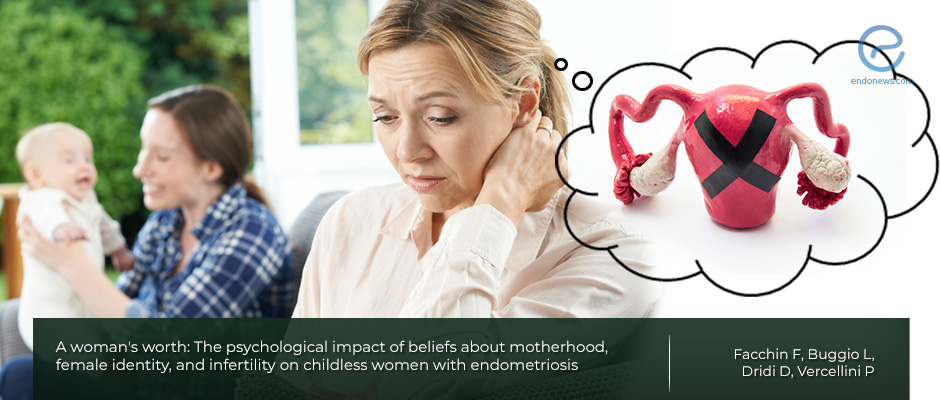Analysis of childless women with endometriosis
Sep 13, 2019
Dysfunctional beliefs about female identity influence the psychological health of childless endometriosis patients.
Key Points
Highlights:
- Childless endometriosis patients who believed that childless and infertile women were less appreciated by others had greater anxiety, depression, and worse overall psychological health, as well as with poorer self-esteem.
Importance:
- This study may provide suggestions for clinical practice by indicating that women’s beliefs regarding the disease and its consequences should be investigated during psychological counseling with endometriosis patients.
- The psychological health of these women may be improved by helping them explore and restructure dysfunctional beliefs about female identity, especially as regards ideas about others’ perceptions.
What’s done here?
- One hundred twenty-seven childless endometriosis patients aged 19–51 years were examined to find out if their beliefs regarding motherhood, female identity, and infertility affected their psychological health.
- Anxiety, depression, and self-esteem were assessed according to the related scales. The authors explored the women’s beliefs regarding motherhood, female identity, and infertility by a set of questions.
Key Points:
- Infertility was diagnosed in 33% of the participants. Only 10% of the participants were currently undergoing or underwent in vitro fertilization.
- Of all participants, 41% was clinically found to be distressed.
- No difference regarding anxiety, depression, and self-esteem was found between fertile and infertile patients.
- Clinically distressed patients were prone to believe that childless women are less socially appreciated than women with children.
- The presence of pain symptoms was related to greater anxiety, poorer psychological health, and lower self-esteem, but did not have any effect on depression.
Limitations:
- Validated measures to explore women’s beliefs were not used.
- Possible advantages and opportunities of being childless were not asked.
- The researchers did not examine the social and cultural variables.
Lay Summary
Facchin F. et al., from Italy studied if the beliefs of childless women regarding motherhood, female identity, and infertility affected their psychological health. They have recently published their study in the Journal of Health Psychology.
The data of this study were derived from the study of Nisenblat et al. which analyzed the psychological impact of endometriosis on 190 women with a surgical or current clinical diagnosis of endometriosis. The participants matched the inclusion criteria of the current study such as diagnosis of endometriosis, age⩾18, and fluency in Italian. Menopausal women, as well as women diagnosed with mental or physical illness other than endometriosis, were excluded from the study. Of the 190 participants, 127 (67%) did not have children and were included in this study.
Demographic and clinical data (including the presence of pain symptoms and diagnosed infertility) were collected using a structured interview or retrieved from medical records. Anxiety and depression were assessed using the Hospital Anxiety and Depression Scale. Self-esteem was measured using the Rosenberg Self-Esteem Scale. Women’s beliefs regarding motherhood, female identity and infertility were explored by a set of questions developed by authors in collaboration with volunteers of an Italian endometriosis patient association, the Endometriosis Project Association. The responses were scored on a 1–5 Likert-type scale (1=“Not at all”; 5=“To a very great extent”). The items of the questionnaire were:
“To what extent do you think that: (a) Having children is very important in a woman’s life; (b) Having children would be/have been very important for your personal fulfillment; (c) A childless woman is less socially appreciated than a woman with children; (d) Infertility may negatively affect the way a woman is seen by others; (e) Infertility may negatively affect the way a woman is seen by her partner; (f) Based on your idea of femininity, being a mother is a fundamental component of being a woman?.”
Infertility was diagnosed in 33% of the participants. Only 10% of the participants were currently undergoing or underwent in vitro fertilization. Of all participants, 41% was clinically found to be distressed. No difference regarding anxiety, depression, and self-esteem was found between fertile and infertile patients. The authors found that endometriosis patients who believed that the fact of not having children could negatively affect the way women are seen by others reported worse mental health (especially depression) and had poorer self-esteem. The presence of pain symptoms was related to greater anxiety, poorer psychological health, and lower self-esteem, but did not have any effect on depression.
This study suggested investigating women’s beliefs regarding the disease and its consequences during psychological counseling with endometriosis patients. Their dysfunctional beliefs about female identity, especially as regards ideas about others’ perceptions can be restructured. The authors stressed the importance of collaboration between clinicians and patient associations regarding the reframing of female identity as a complex, multidimensional concept separated from motherhood, and child-free lifestyle as an option for women, rather than a defect.
Research Source: https://www.ncbi.nlm.nih.gov/pubmed/31298584
endometriosis female identity psychological health self-esteem women’s beliefs childless

